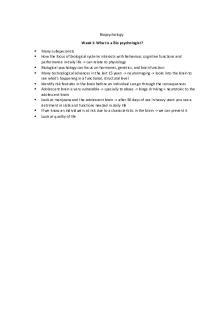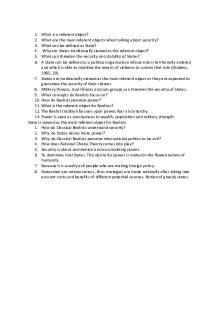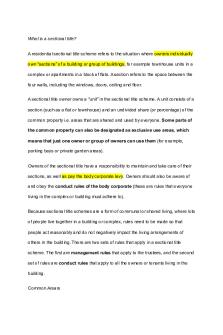To what extent is beneficence a personal moral duty? PDF

| Title | To what extent is beneficence a personal moral duty? |
|---|---|
| Course | Political & Social Thought |
| Institution | Georgetown University |
| Pages | 2 |
| File Size | 82.5 KB |
| File Type | |
| Total Downloads | 80 |
| Total Views | 139 |
Summary
Analyzing and criticizing Singer's theory about moral duty...
Description
To what extent is beneficence a personal moral duty? In a world where almost 700 million people live in extreme poverty and where a global pandemic will probably drive those numbers up, the question of our moral duty in contributing to the resolution of such issues arises. In this essay, beneficence will be defined as an act of generosity, compassion, and kindness with a strong connotation of doing good to others, including moral obligation. (Kinsinge, 2009) Peter Singer, an Australian philosopher, criticizes the current global moral outlook and suggests challenging, ambitious and extensive principles of compulsory beneficence, mainly concerning the act on an individual level. According to his principle, having people who are suffering and starving to death is extremely unethical. Moreover, if it is in our power to prevent something bad from happening without sacrificing something of comparable moral importance, then we ought to do it (Singer, 1972). His principle also clearly distinguished between positive and negative duty, one being a duty to assist and the other a duty to not harm. He clearly focuses on the duty to assist and emphasizes on the idea that neither numbers nor distance determine the extent to which one should help in such causes and that charity and duty overlap more than we consider them to. Singer argues that not only people who are rich, ought to donate but even those who are well off or have disposable income after spending on the bare necessities. The philosopher explains that we should take marginal utility as a measurement tool for how much we donate to others in need. According to him, as long as we don’t harm our basic human needs (food, water, shelter), everything else should be donated to those in need. This would mean reducing our living standards to those of refugees and not “enjoying” any luxuries and non-essential products. Thus, he implies that this moral duty of beneficence requires us to make major sacrifices especially in a world where capitalism rules and where the main aim of people in their lifetime is to earn wealth. This principle has been heavily criticized for its impracticality and unrealisticness. Despite it being based on the equality of mankind and distributive justice, it is so drastic that it requires individuals to be working just to live above the level of suffering. The latter can’t be done in a world where there is a large gap in earnings and no guarantee that if you donate, others will. I personally would see Singer’s theory as being an ideal one assigning individuals a duty to assist the global poor who can be saved from starvation and other dreadful circumstances. However, it is necessary to take into account the current moral framework in our world today and aim at reducing such global issues in a more moderate way such as percentages taken off of wealthy people’s salaries. Bibliography: Kinsinger, Frank Stuart. “Beneficence and the professional's moral imperative.” Journal of chiropractic humanities vol. 16,1 (2009): 44-6. doi:10.1016/j.echu.2010.02.006 Miller, Richard W., 2010, Globalizing Justice: The Ethics of Poverty and Power, Oxford: Oxford
University Press. doi:10.1093/acprof:oso/9780199581986.001.000 Rawls, John, 1971, A Theory of Justice, Cambridge, MA: Harvard University Press. Singer, Peter, 1972, “Famine, Affluence, and Morality,” Philosophy and Public Affairs, 1: 229– 43. Young, I., 2011, Responsibility for Justice, Oxford: Oxford University Press....
Similar Free PDFs

What is a Biopsychologist
- 1 Pages

What is a referent object
- 1 Pages

What is a social fact
- 2 Pages

What is ABA - Grade: A
- 5 Pages

What is race - Grade: A
- 1 Pages

What is a sectional title
- 4 Pages

What is a summary judgement
- 5 Pages
Popular Institutions
- Tinajero National High School - Annex
- Politeknik Caltex Riau
- Yokohama City University
- SGT University
- University of Al-Qadisiyah
- Divine Word College of Vigan
- Techniek College Rotterdam
- Universidade de Santiago
- Universiti Teknologi MARA Cawangan Johor Kampus Pasir Gudang
- Poltekkes Kemenkes Yogyakarta
- Baguio City National High School
- Colegio san marcos
- preparatoria uno
- Centro de Bachillerato Tecnológico Industrial y de Servicios No. 107
- Dalian Maritime University
- Quang Trung Secondary School
- Colegio Tecnológico en Informática
- Corporación Regional de Educación Superior
- Grupo CEDVA
- Dar Al Uloom University
- Centro de Estudios Preuniversitarios de la Universidad Nacional de Ingeniería
- 上智大学
- Aakash International School, Nuna Majara
- San Felipe Neri Catholic School
- Kang Chiao International School - New Taipei City
- Misamis Occidental National High School
- Institución Educativa Escuela Normal Juan Ladrilleros
- Kolehiyo ng Pantukan
- Batanes State College
- Instituto Continental
- Sekolah Menengah Kejuruan Kesehatan Kaltara (Tarakan)
- Colegio de La Inmaculada Concepcion - Cebu








